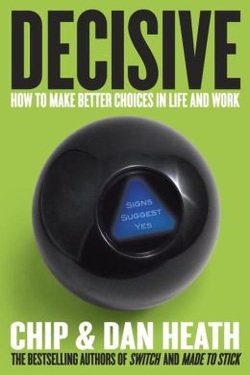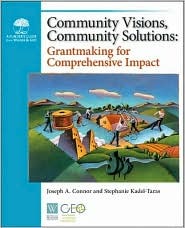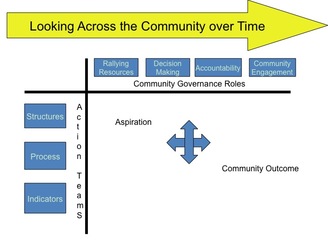In my work with over 75 communities across North America, on achieving transformative results on issues ranging from educational outcomes to poverty reduction to economic development, I've come to see that at the very heart of success there are just two interrelated and mutually dependent, elements: the need to change expectations or the "inner attitudes" in James' phrasing and the need to work differently, to innovate. The beauty is that these changes, when embraced, can reinforce each other in a virtuous cycle of improvement.
Expectations define and shape the context or ecosystem wherein an innovation takes root or is starved for resources. Let's take for example, a transformation in expectations that I have seen in our working differently communities in the last few years. The new "inner attitude" by growing parts of the community is that ALL children can/should succeed in school. The old standard or expectation was: when a child failed it was seen as their fault (or the fault of their parents, or the fault of their circumstances, i.e., poverty or race). All of the prior "innovations" were in interventions believed required to address the child's failings, and all of the rest of the adults went on as business as usual.
"We don't have a kid problem. We have an adult problem." -- Bill Millikan founder of Community in Schools on receiving a life-time achievement award at the ASU Education Innovation Summit (4-17-13)
Instead, when we change the expectation to ALL children can succeed, the innovations concentrate on what the adults are failing to accomplish, or how the system needs to support these adults in deeper richer ways, so that the system meets the expectation -- all of the children do in fact achieve outcomes. This shift in expectations, has a profound shift in the ecosystem which in turn directly affects the success of innovations.
Failure of Innovation, whether a new high tech application available in the itunes store or a community process, has three possible henchmen. All of which are directly influenced by expectations and in turn reinforces or undermines that ecosystem.
1. Knowledge
2. Design and Engineering
3. Adoption and use
Failure of knowledge is striking for how prevalent it is. We have a fanciful image of the innovator as the lone dreamer. Sitting in contemplation until the "eureka" moment, where often proof is in the assertion of correctness. There have been huge waves of wasted effort across all of our institutions and communities based on ideology or philosophy rather than rigorous investigation. It is incumbent on all of us to be much more critical about the next "shiny object" before we fall head over heals in pursuit. A good rule from scientific research: if it sounds intuitive, it's probably wrong.
The first of the Seven Habits of Highly Successful Communities is to "reach for it." We must change our "inner attitudes," so we can change the outer aspects of our lives. For without this focus on context, most innovations will fail. We must be clear as to what needs to change (be accomplished) and how will we know (measure) whether the innovation is moving us in the direction of our expectations.
These observations are "with thanks" to James Shelton, Deputy Secretary US Department of Education, adapted in part from his keynote at the recent ASU Education Innovation Summit.
To be tweeted links to my new posts -- blog, book reviews (both nonfiction and fiction), data or other recommended tools -- either go to Twitter.com and follow me @jcrubicon, or just go to my Home page and click on the Twitter button on the right, just above the tweet stream, and follow me @jcrubicon.





 RSS Feed
RSS Feed
